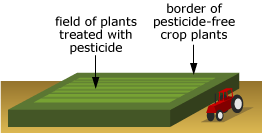Marine preserves where fishing is banned provide a safe haven for genetic variation — specifically for the genes for large body size in fish. In the rest of the ocean, large fish are selectively harvested, and when those fish go, they take their genes for large body size along with them. But in a refuge, large fish live to breed another day and pass their genes onto the next generation. And that means that those genes remain in the population where they slow the evolution of the population towards small body sizes.

That all might seem rather specific to fish conservation, but in fact, the same strategy can be applied to a multitude of evolutionary problems. For example:

- In agriculture, the use of pesticides on crops applies strong selection favoring insects with genes to resist those pesticides. In that situation, pesticide resistance evolves quickly, shortly rendering many pesticides useless against their target insects. However, by planning for this evolution and guarding against it, farmers can slow the evolution of pesticide resistance, prolonging the usefulness of particular pesticides and allowing them to use less pesticide overall. Farmers manage pest evolution by creating refuges where no pesticide is sprayed alongside their regular crop; these refuges serve as havens for non-resistant insects and keep those non-resistant genes in pest populations.

- In medicine, the evolution of antibiotic resistance is a major problem. Drugs that used to wipe out tuberculosis, pneumonia, and strep throat, for example, no longer work against many of the bacteria that cause these diseases. In order to slow the evolution of antibiotic resistance in pathogens, medical practitioners now recommend a more targeted use of antibiotics — only prescribing them when really necessary and avoiding their overuse (e.g., using antibiotics preventatively in chicken and cattle feed). These strategies essentially provide antibiotic-free refuges for bacteria with genes that make them susceptible to the antibiotics. By maintaining lots of refuges for non-resistant bacteria, we increase the chances that a new serious infection will be caused by a susceptible strain that can be effectively combated with existing antibiotics.
The effectiveness of the refuge strategy in so many different situations highlights the importance of basic research in evolutionary biology. Like any scientific theory, evolutionary theory makes broad predictions that can be applied in many different situations, and the more we understand about how evolution works in general, the more we understand about how evolution works in specific situations that affect our everyday lives.
Dig deeper: read more about agricultural refuges and slowing the evolution of antibiotic resistant bacteria.
